In today’s agricultural market, various factors are influencing the trading outcomes for commodities. Weather conditions are impacting the southern growing belt of Australia, leading to rain, harvest delays, and extreme fire danger harvest bans. These conditions are affecting productivity in key regions such as Victoria and New South Wales. Globally, market movements remain stable without any significant shifts.
Market trends show that wheat prices attempted to rise initially due to Russia’s rationing mode, but this momentum couldn’t be sustained. However, Matif, a European futures exchange, demonstrated strength, indicating a potential demand for their wheat in the global market. In the Australian market, as the Christmas season approaches, there is a need for spot coverage in delivered homes. Despite missing out on Saudi business opportunities, Australia remains well-positioned for potential buyers in East Africa. The exchange rate, with the Australian Dollar remaining below 0.6400, is expected to remain stable.
Offshore, recent developments in the Saudi tender indicate that the EU, Romania, Ukraine, and Argentina filled the gap, with Australia narrowly missing out on the deal. Russia, constrained by quota restrictions, is unable to offer significant contributions. This scenario has positioned Matif favorably to receive future business opportunities. Meanwhile, in the political arena, President-elect Trump’s comments on Ukraine hint at possible territorial negotiations, impacting global dynamics.
Market speculations reveal unique fund positions in wheat, corn, and soybeans, with a breakdown in traditional correlations. Corn remains tight even without Chinese engagement, influencing market dynamics. In the financial sector, US equities closed positively, with expectations of interest rate decisions from major central banks. The S&P 500 and Nasdaq 100 recorded gains, driven by optimism in the market. However, weaker retail data from China led to losses in Asia and Europe.
In Australia, canola bids have increased in Western Australia, with notable spreads compared to previous years. Wheat and barley bids have also seen fluctuations, reflecting market conditions. In the eastern region, canola bids have risen significantly, while cereal bids remain stable. The upcoming week is expected to be hot and dry, aiding ongoing harvest activities. However, challenges persist, such as unpredictable weather conditions affecting agricultural operations.
Overall, the agricultural market is influenced by a combination of local and global factors, shaping trading outcomes for commodities. It is crucial for market participants to stay informed about changing dynamics and adapt their strategies accordingly. Stay updated with the latest news and trends in the grain industry by subscribing to our newsletter. Click here to receive free news straight to your inbox.




